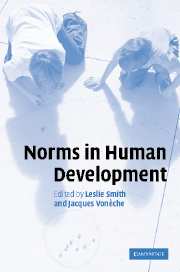Book contents
- Frontmatter
- Contents
- List of figures
- List of tables
- List of contributors
- Acknowledgments
- 1 Norms in human development: introduction
- Part I Norms and development in epistemology
- Part II Norms in moral and social development
- Part III Norms in cognitive development
- 9 Can psychology be a quantitative science, or is Kant right after all? Normative issues in psychometrics
- 10 Norms and intuitions in the assessment of chance
- 11 Making conditional inferences: the interplay between knowledge and logic
- References
- Index
11 - Making conditional inferences: the interplay between knowledge and logic
Published online by Cambridge University Press: 22 September 2009
- Frontmatter
- Contents
- List of figures
- List of tables
- List of contributors
- Acknowledgments
- 1 Norms in human development: introduction
- Part I Norms and development in epistemology
- Part II Norms in moral and social development
- Part III Norms in cognitive development
- 9 Can psychology be a quantitative science, or is Kant right after all? Normative issues in psychometrics
- 10 Norms and intuitions in the assessment of chance
- 11 Making conditional inferences: the interplay between knowledge and logic
- References
- Index
Summary
Conditional (if-then) reasoning occupies a central place in the study of logical reasoning. Reasoning with conditionals is a part of everyday thinking (e.g. Scholnick & Wing, 1991) and is important to activities such as reading (Lea et al., 1990). In addition, the ability to make ‘if-then’ inferences that are hypothetical and logical underlies much of formal mathematics and underpins many of the physical sciences. Understanding the nature and the corresponding developmental trajectory of conditional reasoning abilities is thus crucial to the basic understanding of the nature of logical reasoning. This is also important for very practical reasons, since promoting the ability to reason logically must be an important educational goal.
Conditional reasoning is one of the key components of a system of logical norms referred to as propositional logic. Although modern logic acknowledges the existence of different forms of logic, there is an intuitive presumption that standard propositional logic constitutes a template for logical reasoning. This can be seen in textbooks that teach logic and reasoning, where propositional logic is an explicit or implicit model for good reasoning. There is also a clear link between the idea that standard propositional logic is the norm for good reasoning and psychological theories of the nature and development of reasoning abilities. This can be seen most clearly in two important theories that share a common biological theme.
Information
- Type
- Chapter
- Information
- Norms in Human Development , pp. 237 - 252Publisher: Cambridge University PressPrint publication year: 2006
